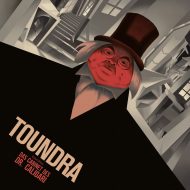 The strange title of this album beat me at first and still does, but I do now know that it refers to a German silent horror film of the same name from 1920. A far cry from the days when this Spanish instrumental post rock band put out albums such as “II” and “III”. I first got to know about Toundra when I saw them play an evocative set at ProgPower Europe in 2013, at which point I took notice of them and gave them the Facebook “like”, so the recent heightened activity on the band’s page told me that something was in the offing again. Well here it is.
The strange title of this album beat me at first and still does, but I do now know that it refers to a German silent horror film of the same name from 1920. A far cry from the days when this Spanish instrumental post rock band put out albums such as “II” and “III”. I first got to know about Toundra when I saw them play an evocative set at ProgPower Europe in 2013, at which point I took notice of them and gave them the Facebook “like”, so the recent heightened activity on the band’s page told me that something was in the offing again. Well here it is.
Toundra’s music lends itself to a theme as they are so good at painting musical pictures and implanting images, without the need for words of course. And so here Toundra get us in the mood with lush melancholy before embarking on the six Acts of this work. It’s all about mood. Dreamy, sinister, powerful …. Toundra place the scene with clarity. Faintly, orchestral, the guitar is like cascading leaves with tragedy not far away. Unlike some instrumental bands who just play, with Toundra you’re in their garden lapping up the sensations and delicate touches. This is beautifully landscaped. The melancholy remains but the atmosphere is warm and personable. The dream goes on. The sensitive and magnetic pattern of “Act I” is taken into “Act II” before stopping, ominously. The restart is familiar but haunting and has something malevolent about it. Toundra won’t ram anything down your threat. You just get the feel of it. The tension mounts. The storm subsides and “Act II” ends with a sort of alternative post rock and the ominous sound of bells. But as ever, it’s the guitar lines ringing crystal clear in the foreground which stick most in the mind.
By “Act III”, the scene has become deathly. The ringing sound remains, but horror is in the air. Every note and every sequence has impact. Now it takes on a psychedelic aspect. There’s a faint Middle Eastern whiff in the air, as the guitar work moves out of its familiar ring into smokier, more dangerous territory. Climax reached gently, “Act IV” starts slowly and deliberately. Where Toundra have indulged us so far, now we must do the work. I guess this is where we are invited to reflect on the album’s and film’s theme of the danger of ideologies. The delicate guitar work is there, but the room has gone quiet. After 8 minutes or so, it bursts open, the music becomes louder and invades our thinking space before reverting to customary post rock hypnosis. 10 minutes is the minimum for each of these Acts, but “Act V” is the longest at almost fourteen and a half minutes. Where some of the previous pieces have been exploratory, this one buries itself in swathes of sadness. It’s done sensitively. Only at the very end are we subjected to violent echoes. It’s quite a shock. The final Act features a strange cosmic sound wave and the equivalent of an electric storm, leading me to think that such variation might have been included earlier. The delicate guitar pattern is there and provides the calming post rock reassurance which contrasts with the moments of disquiet. The album ends majestically as it should.
Whilst I think a film like “Das Cabinet des Dr. Caligari” is ideal for Toundra to explore, particularly as their music crosses boundaries with its cinematic quality, I had no overriding sense of any particular film or theme when listening to this album. Of course I’d never heard of the original film, which shouldn’t have to be a pre-requisite. Moreover, the album doesn’t have to be a soundtrack, which it isn’t anyway. While the pattern resurfaces, it has its own ambience, tells its own story and doesn’t seem reliant on any external media. That’s good and allows greater creativity. Taken on its own, Toundra demonstrate their musical qualities and in particular their ability to elicit emotions and draw vivid images. At around 72 minutes, it could be accused of being repetitive and long-winded, and it does require patience as the epic moments are spread sparingly. But its atmospheres are both sublime and haunting, and “Das Cabinet des Dr. Caligari” reconfirms Toundra’s status as one of the most thoughtful instrumental bands out there.
(8/10 Andrew Doherty)

Leave a Reply